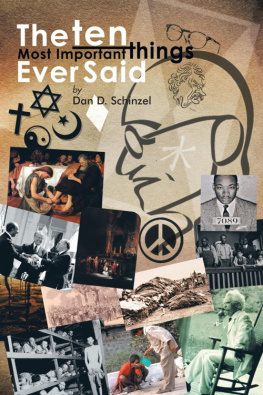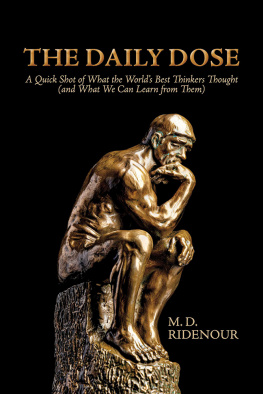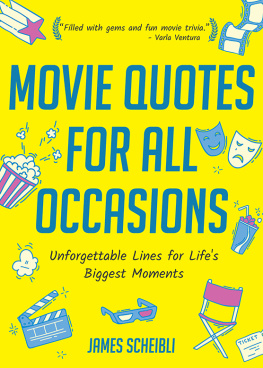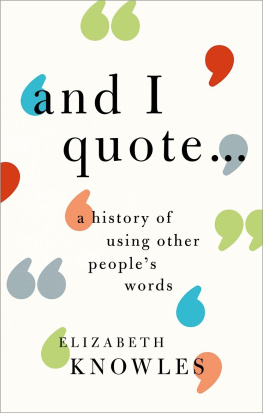The ten
Most Important things
Ever Said
Dan D. Schinzel

AuthorHouse
1663 Liberty Drive
Bloomington, IN 47403
www.authorhouse.com
Phone: 1-800-839-8640
2012 by Dan D. Schinzel. All rights reserved.
No part of this book may be reproduced, stored in a retrieval system, or transmitted by any means without the written permission of the author.
Published by AuthorHouse 06/29/2012
ISBN: 978-1-4772-2799-2 (sc)
ISBN: 978-1-4772-2798-5 (hc)
ISBN: 978-1-4772-2797-8 (e)
Library of Congress Control Number: 2012911250
Any people depicted in stock imagery provided by Thinkstock are models, and such images are being used for illustrative purposes only.
Certain stock imagery Thinkstock.
This book is printed on acid-free paper.
Because of the dynamic nature of the Internet, any web addresses or links contained in this book may have changed since publication and may no longer be valid. The views expressed in this work are solely those of the author and do not necessarily reflect the views of the publisher, and the publisher hereby disclaims any responsibility for them.
Contents
 It is your care for others that is the true measure of your greatness.
It is your care for others that is the true measure of your greatness.
Jesus of Nazareth
 A mans true wealth hereafter is the good he does in this world to his fellow man.
A mans true wealth hereafter is the good he does in this world to his fellow man.
Muhammad
 Before you embark on a journey of revenge, dig two graves.
Before you embark on a journey of revenge, dig two graves.
Confucius
 Let he who is without sin cast the first stone.
Let he who is without sin cast the first stone.
Jesus of Nazareth
 Sacred cows make the best hamburger.
Sacred cows make the best hamburger.
Samuel Clemens
 Gentleness, self-sacrifice and generosity are the exclusive possession of no one race or religion.
Gentleness, self-sacrifice and generosity are the exclusive possession of no one race or religion.
Mohandas Gandhi
 Treat the earth well: it was not given to you by your parents, it was loaned to you by your children.
Treat the earth well: it was not given to you by your parents, it was loaned to you by your children.
Native American Proverb
 In the End, we will remember not the words of our enemies, but the silence of our friends.
In the End, we will remember not the words of our enemies, but the silence of our friends.
Martin Luther King, Jr.
 You never really understand a person... until you climb into his skin and walk around in it.
You never really understand a person... until you climb into his skin and walk around in it.
Atticus Finch, To Kill a Mockingbird
 Everything can be taken from a man but one thing: the last of the human freedomsto choose ones attitude in any given set of circumstances, to choose ones own way.
Everything can be taken from a man but one thing: the last of the human freedomsto choose ones attitude in any given set of circumstances, to choose ones own way.
Viktor Frankl
Nothing makes me more uncomfortable than listening to a poor speaker struggle to hold it together in front of a restless, inattentive audience. I have on too many occasions sat in just that sort of crowd, cringing as an ill-prepared presenter rambles on, repeating himself or herself over and over in between seemingly interminable pauses. In those situations, I tend to stare at my feet, unwilling to watch the unfolding train wreck. I wince as I listen to the incoherent speech, hoping the torture will soon end for everyone involved. It is only when I hear the sound of courteous applause that I can look up.
But such excruciating experiences are offset by those occasions when I hear a speaker express an idea or story or emotion with eloquence and concision. While style and delivery are important, I would argue that an entertaining, effective speech is mostly the product of good writing. A talented writer can make even a bland or timid speaker sound stirring.
Unfortunately, writing is a maddening endeavor. Most of us are unable to get out of our own way when we put pen to paper. The words we write do not seem to match the ideas we have and we end up with an unwieldy, disjointed mess. After wadding up the offending piece of paper and depositing it in a nearly overflowing wastebasket, we then stare at another blank page, hoping for some divine inspiration. (Note to reader: I have been accused of being a Luddite, as I still use a pen and paper on first drafts of my writing. For those of you whose feet are firmly planted in this century, the scene just described might be altered by referencing a delete button instead of a wastebasket.)
My inability to translate my thoughts into words leads me to produce writing that often lacks focus and is much too wordy. While I clearly understand that the most essential characteristic of an effective argument, essay or speech is brevity, I am incapable of controlling my verbal gluttony. And so out of this frustration with my own clumsy writing and speech comes a deep appreciation for those rare souls who, in a mere sentence or two, can clearly convey an idea and elicit an emotional response from a reader or an audience. These are the people we quote. The economy of their words provides us a nicely packaged expression that is convenient, versatile and easily stored, perhaps on a slip of paper or perhaps merely tucked away in our memory banks.
I love a good quote. You might call it an obsession. But my obsession with quotes is not restricted to the words themselves. I am just as fascinated with the people behind the quotes and the circumstances that inspired those people to craft their timeless words.
My captivation with the words of others is really a byproduct of my love for reading. Because I was exposed to countless great teachers and surrounded by a family of readers, I developed an insatiable appetite for the written word. Any written word. Fiction, literature, history, newspapers, backs of cereal boxes: all of these can hold my interest.
I also learned to be an active reader. I underline, take notes in the margins, dog-ear pages, all in an effort to retain ideas or phrases or even names that are of particular interest. Those who lend me books usually end up regretting it! From all this note-taking I have managed to form a fairly extensive collection of quotes and sayings that represent some of the best ideas I have come across in my reading. The ten that I have chosen for this book are taken from that collection.
Because ideas are not expressed in a vacuum, learning something about the person to whom a quote is attributed is essential if we are to fully appreciate its intended meaning. The quotes chosen for this book come from a wide variety of sources that span different cultures and times. One technique that helps me capture the context of a quote is to place myself in a scene of my creation with the author. I accomplish this historical fantasy simply by closing my eyes and transporting myself to the relevant place and time. I then either imagine myself as an active player in a scene, engaged in both dialogue and action with the person to whom a quote is attributed, or I assume the role of an unseen observer, a fly on the wall if you will, using all my senses to soak in the scene I have created for the person I am trying to get to know.
For this book, I ended up with ten separate scenes for the ten quotes chosen, each taking the form of a conversation involving a character created in the likeness of the attributed author. Each conversation is the creation of my imagination, a fantasy meant to expose the soul of the character while illuminating the meaning of the quote itself. Some settings for those conversations are based on either actual or apocryphal stories involving the author, while others are completely fictitious. I encourage readers to create their own conversations as well. In other words, close your eyes and fantasize as you work your way through the book.
Next page












 It is your care for others that is the true measure of your greatness.
It is your care for others that is the true measure of your greatness. A mans true wealth hereafter is the good he does in this world to his fellow man.
A mans true wealth hereafter is the good he does in this world to his fellow man. Before you embark on a journey of revenge, dig two graves.
Before you embark on a journey of revenge, dig two graves. Let he who is without sin cast the first stone.
Let he who is without sin cast the first stone. Sacred cows make the best hamburger.
Sacred cows make the best hamburger. Gentleness, self-sacrifice and generosity are the exclusive possession of no one race or religion.
Gentleness, self-sacrifice and generosity are the exclusive possession of no one race or religion. Treat the earth well: it was not given to you by your parents, it was loaned to you by your children.
Treat the earth well: it was not given to you by your parents, it was loaned to you by your children. In the End, we will remember not the words of our enemies, but the silence of our friends.
In the End, we will remember not the words of our enemies, but the silence of our friends. You never really understand a person... until you climb into his skin and walk around in it.
You never really understand a person... until you climb into his skin and walk around in it. Everything can be taken from a man but one thing: the last of the human freedomsto choose ones attitude in any given set of circumstances, to choose ones own way.
Everything can be taken from a man but one thing: the last of the human freedomsto choose ones attitude in any given set of circumstances, to choose ones own way.